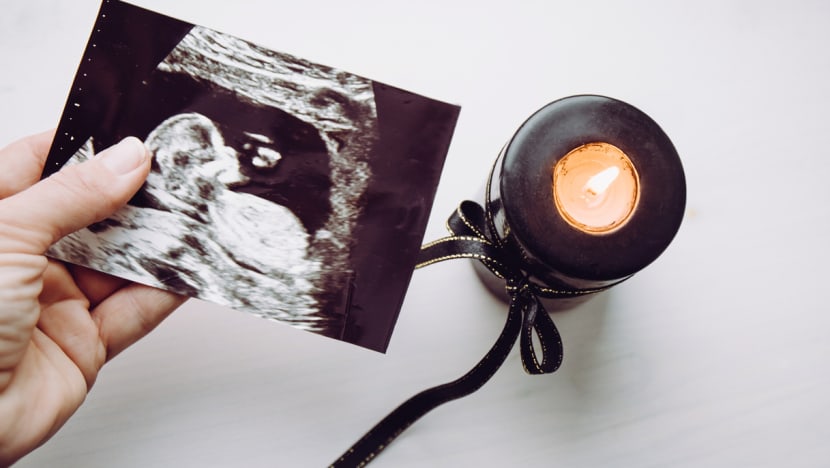Commentary: This is for every mother who has lost a baby
Women who have suffered a pregnancy loss struggle with conflicting emotions on Mother’s Day. CNA's Alison Jenner recounts her experience.

File photo. In Singapore, about 20 per cent of pregnancies end in a miscarriage – most of which take place in the first trimester. (iStock/Helin Loik-Tomson)
SINGAPORE: I remember my first Mother’s Day after the birth of my daughter. I was living in Hong Kong then. The extended family was having lunch at a dim sum restaurant and the waiter was going table to table, handing out carnations. He arrived at ours and gave a stalk of pink carnation each to my mother-in-law and my sister-in-law, wishing them a happy Mother’s Day.
I didn’t get one. My family didn't speak up. The pain cut deep. I felt unseen.
The waiter didn’t make a mistake, he just didn’t know I was a mother. How could he? I had nothing to show for it - no fussy newborn, no diaper bag, no milk bottle, no bulky stroller.
Five months earlier, I gave birth to a baby girl after 36 hours of labour. But I never got to take her home. She was born sleeping.
Annabelle was born just shy of 24 weeks, perfectly formed with all her fingers and toes. She weighed 500g, as light as a packet of sugar.
Complications in the pregnancy - which resulted in a month-long stay in the hospital, heavy bleeding, blood transfusions and an infection - had forced us to induce labour and terminate the pregnancy.
INVISIBLE MOTHERS AND CHILDREN
For thousands of women around the world who have lost a child, Mother’s Day is a grief minefield - you feel you deserve to be acknowledged, but yet the day is also a crushing reminder of your loss.
It wasn’t that I really wanted that flower from the waiter. I just wanted the acknowledgement that my daughter was born into this world, even if she never got the chance to live.
Although pregnancy loss is common, it remains a taboo subject. There isn’t enough conversation around it. Friends and relatives of those who have suffered a loss often shy away from talking about it, perhaps for fear of reminding mothers of their loss. Most do not know what to say.
Yes, it is painful to talk about, but it is even more painful to think that our children are invisible to others.
In Singapore, about 20 per cent of pregnancies end in a miscarriage - most of which take place in the first trimester.
For stillbirths - defined as a baby who dies at or after 28 weeks of pregnancy - about 1.9 million babies were stillborn globally in 2021. Singapore has one of the lowest stillbirth rates in the world, with 78 cases registered in 2021.
But no matter how common or low those rates may be, many women feel alone after experiencing a miscarriage or stillbirth. There’s a lot of shame and guilt involved, a lot of “what ifs” and “if only”. Well-intentioned advice and words of support from friends and family can come across as insensitive.
Women who have lost babies feel pressured to stay silent and to grieve alone, says a World Health Organization report. Often, they are also left alone to deal with intense physical changes after the miscarriage or stillbirth.
In my case, I was very affected a few days after the birth when I woke up with two wet patches on my T-shirt. My body was making milk, but there was no baby to feed.
WHEN THE GRIEF SUBSIDES
Losing a child is one of the deepest sorrows a heart can know, it goes against the natural order of life.
The loss of pregnancy and foetal death is a traumatic life event, and inadequate management can lead to complicated mental health challenges. Studies have shown women who have had a pregnancy loss have higher levels of anxiety, depression and post-traumatic stress disorder than those who have not experienced such events.
A study published in the American Journal of Obstetrics and Gynecology in 2020 showed that one month after loss of pregnancy, 29 per cent of women reported symptoms suggestive of post-traumatic stress, 24 per cent of moderate-severe anxiety and 11 per cent of moderate-severe depression. Their distress declined over time, but remained at clinically important levels even after nine months.
Such data show the psychological impact of pregnancy loss on women, which is important for medical practitioners and loved ones to understand.
Many years have passed since I lost my daughter. The intense grief has subsided, replaced by an emotional scar that, like physical scars, tells a story of a life lived and a journey travelled - even if there were painful bumps along the road.
I’ve had two boys since my daughter was born, but I was a mother long before the world saw me as one.
This Mother’s Day, take a few moments to remember the invisible mothers around you. If you have a friend or a relative who’s lost a child, be sensitive but don’t avoid the topic. Simply say: “It’s Mother’s Day, and I’m thinking about you”.
And if you are a mother who has lost a child, I see you.
Alison Jenner is senior editor at CNA Digital where she oversees commentaries.

















